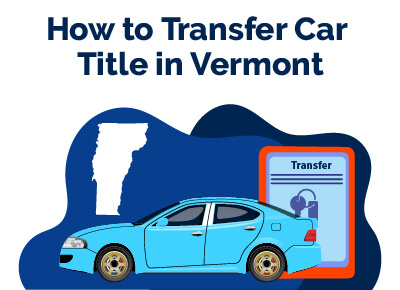How To Transfer a Car Title in Vermont
August 25, 2023


Chris is Head of Content for FindTheBestCarPrice and is based out of Philadelphia, PA. As a seasoned automotive industry analyst and car enthusiast, he ensures the highest level of quality across all our content and curates our picks for the best deals each month.
Chris studied information systems and marketing at Drexel University and writes about a wide range of topics ranging from car buying tips to troubleshooting common mechanical issues.
When he’s not thinking about cars, he likes to stay in with his dog and make an “attempt” to finish a crossword puzzle (he’s not quite at the Saturday/Sunday level…yet). As a former cheesemonger, Chris still has a “sharp” passion for all things cheese, and his fridge is always loaded with it!
Chris also has a passion for things that go fast, and drones are no exception. He spends some of his time writing for Dronesourced.
If you're in Vermont and need to transfer a vehicle's ownership, whether you're selling your car, gifting it, or registering an out-of-state vehicle, understanding the car title transfer process is essential.
This step is crucial not just for legal ownership transfer but also for ensuring the Vermont DMV has accurate records, which helps prevent fraud.
While it might seem daunting, transferring a car title in Vermont is straightforward with the right information.
This guide is designed to walk you through the car title transfer process in Vermont, making it simple and hassle-free.
Table of Contents
- How Much Does It Cost To Transfer a Car Title in Vermont?
- How To Transfer a Car Title in Vermont If You Buy From a Private Seller
- How To Transfer a Car Title in Vermont If You Buy From the Dealership
- How To Transfer a Car Title in Vermont If You're a New Resident
- How To Transfer a Car Title in Vermont If You're the Seller
- Vermont License Plates
- How To Fill Out Car Title Transfer Forms in Vermont
- Best Car Deals by Category
- Frequently Asked Questions
How Much Does It Cost To Transfer a Car Title in Vermont?
When transferring a vehicle title in Vermont, you'll encounter various fees. The following is a breakdown of the titling fees and taxes that are applicable when you're titling a Vermont vehicle:
- $35 for an original vehicle title.
- $35 for a vehicle title transfer.
- $35 to clear a vehicle title after lien removal.
- $35 for a corrected vehicle title.
- $35 for a duplicate vehicle title.
- $11 for an assignment of security interest to a vehicle title.
- $20 for a vehicle title search.
- 6% of the taxable vehicle cost for vehicle tax.
How To Transfer a Car Title in Vermont If You Buy From a Private Seller
When purchasing a car from the dealership, the title transfer process is usually handled for you. If you're buying from a private seller in Vermont, you must follow several crucial steps, which include:
- Ensure the seller has signed the title and handed it to you.
- Ensure that the seller assists you in completing the Vermont Bill of Sale and Odometer Form.
- Obtain a lien release from the seller, as Vermont law prohibits the sale of any vehicle with a lien.
- Fill out the Registration/Title/Tax Application.
- Bring all necessary documents, payment for the title transfer fee, and registration to the Vermont DMV office. The transfer fee is $33, and a 6% tax must be paid. You can transfer the registration for $23 or opt for a new one, which will cost between $70 and $129.
How To Transfer a Car Title in Vermont If You Buy From the Dealership
When you procure a car from a dealership, the dealership typically handles the titling and registration process on your behalf.
However, if the dealership does not handle the necessary paperwork, you must visit your local VT DMV office to title the car.
To transfer the title of a car purchased from a Vermont dealership, you'll need the following documents:
- The Manufacturer's Certificate of Origin (MCO) or a New Vehicle Information Statement for vehicles built in Canada
- A completed Vermont Bill of Sale and Odometer Disclosure Statement
- A completed Registration/Tax Application (Form VD-119) if you want to register your vehicle at the same time
Be sure to have these forms to properly transfer the title of a Vermont car purchased from a dealership to ensure timely delivery.
How To Transfer a Car Title in Vermont If You're a New Resident
Obtaining a Vermont vehicle registration within 60 days of establishing residency or before the expiration of the out-of-state vehicle registration, whichever comes first, is crucial.
Two essential requirements to note when registering a vehicle in Vermont are the need for liability insurance coverage of no less than the minimum statutory amount and a mandatory vehicle inspection within 15 days of registration at a Vermont licensed inspection station.
To obtain a Vermont vehicle registration, one must provide the following to the DMV:
- Completed registration application form.
- Vehicle title (if the lienholder is holding the title, the owner/lessee must appear in person with the full name of the lienholder).
- Updated odometer reading.
- Proof of the cost of purchase and use or sales tax paid on the car to any previous state, including vehicle and owner information. Note that a value will be assessed to the vehicle using NADA, and if proof of payment of taxes to another state is available, the amount will be deducted from taxes due to Vermont.
- Proof of purchase and use or sales tax paid is not required if the vehicle has been owned for over three years in a state that collects the tax, and the owner can provide either a title displaying an issue date of three years or more in the past or supply three years' worth of registrations.
- Payment of all fees.
Regarding driver's licenses, when applying for a Vermont driver's license as a new resident, an eye examination will be required if the applicant possesses a valid out-of-state license or one that expired within the last three years.
The applicant must surrender the out-of-state license when the Vermont license is issued and must provide documentation to establish their identity.
For more information on registration or licenses, visit dmv.vermont.gov/registrations/new or dmv.vermont.gov/licenses/new, respectively.
How To Transfer a Car Title in Vermont If You're the Seller
If you're selling a car in Vermont, the buyer must complete and submit the required paperwork to the VT DMV.
As the seller, you must provide the necessary documentation to the buyer, which includes:
- Assigning the original vehicle title to the buyer
- Completing a Bill of Sale and Odometer Disclosure Statement (Form VT-005) with the buyer
- Providing a lien release (if applicable). Note that you cannot sell the vehicle if it has a lien.
Vermont License Plates
The Department of Motor Vehicles (DMV) will furnish you with a pair of license plates, a validation sticker with the expiration date, and a registration card.
Securely attach the plates to the front and rear of your vehicle, ensuring they are visible. The validation sticker should be affixed to the rear plate.
If your vehicle is a motorcycle, semitrailer, or trailer, DMV will provide a single license plate for the vehicle.
License plates must remain unobstructed, and the numerals and letters must always be easily legible. A registration validation sticker must remain unobstructed, and it must be affixed as follows:
- For vehicles with registration plates measuring approximately 12 x 6 inches, place the validation sticker in the bottom right corner of the rear registration plate.
- For vehicles with a registration plate measuring approximately 7 x 4 inches, place the validation sticker in the top right corner of the rear registration plate.
How To Fill Out Car Title Transfer Forms in Vermont
To ensure the proper completion of Vermont vehicle title and title transfer forms, obtaining the required signatures of the car's seller and buyer in the designated areas on the title is essential.
A bill of sale providing information about the vehicle, such as make, year, model, color, and VIN, must be created.
If the vehicle is sold instead of gifted, car sales tax must be added to the total price, and the "transfer of title by seller" section of the title must include an accurate odometer reading. The recipient of the vehicle must also sign the title in the designated spaces.
It is noteworthy that extra paperwork may be deemed necessary, such as a valid Vermont vehicle insurance policy that is valid and meets or surpasses the minimum coverage thresholds mandated by the state and a government-issued photo ID or foreign passport legitimate for establishing identity.
Best Car Deals by Category
Frequently Asked Questions
What is a Vermont car title transfer?
Transferring the legal ownership of a car from one individual to another within the boundaries of Vermont is known as a Vermont car title transfer.
When is a Vermont car title transfer required?
A Vermont car title transfer is required when the owner changes their name or address or when a vehicle is sold, gifted, or inherited.
How do I transfer a car title in Vermont?
To effectuate a car title transfer in Vermont, one must accurately complete the requisite forms, present the necessary documentation, remit the fee, and tender the application to the Vermont Department of Motor Vehicles (DMV).
What documents do I need for a Vermont car title transfer?
To transfer a car title in Vermont, you need the car title, a bill of sale, the current registration, a valid government-issued photo ID or a foreign passport, and a valid Vermont car insurance policy that meets the state's minimum coverage limits.
Do I need a notary public for a Vermont car title transfer?
No, you do not need a notary public for a Vermont car title transfer. However, you must ensure the seller and buyer sign the title in the designated areas and provide the required information.
What does it cost to transfer a car title in Vermont?
The cost to transfer a car title in Vermont is $35.00. Additional fees for other services, such as vehicle registration, taxes, and title searches, may apply.
How long does it take to transfer a car title in Vermont?
The processing time for a Vermont car title transfer varies depending on the DMV workload and the completeness of the application. It may take several weeks to receive the new title in the mail.
Posted in Car Buying Tips |




